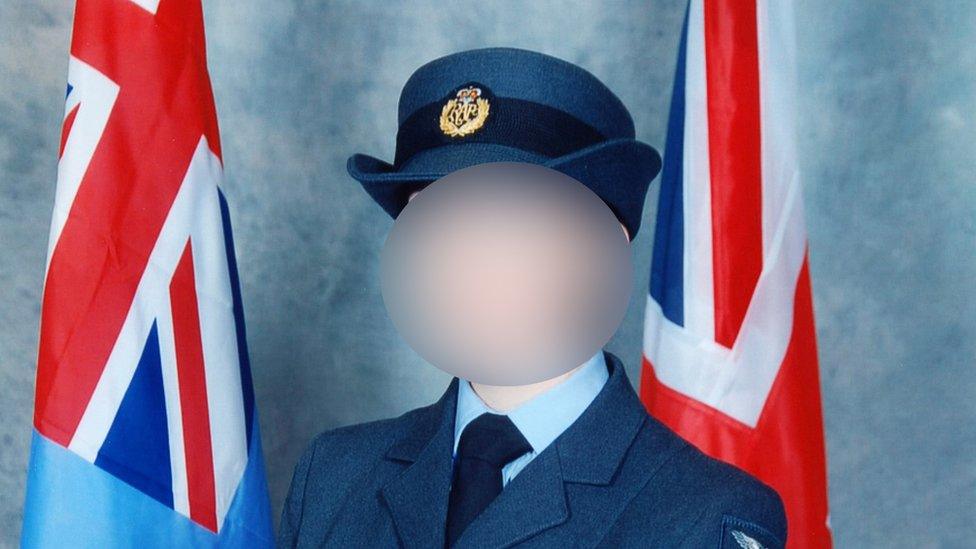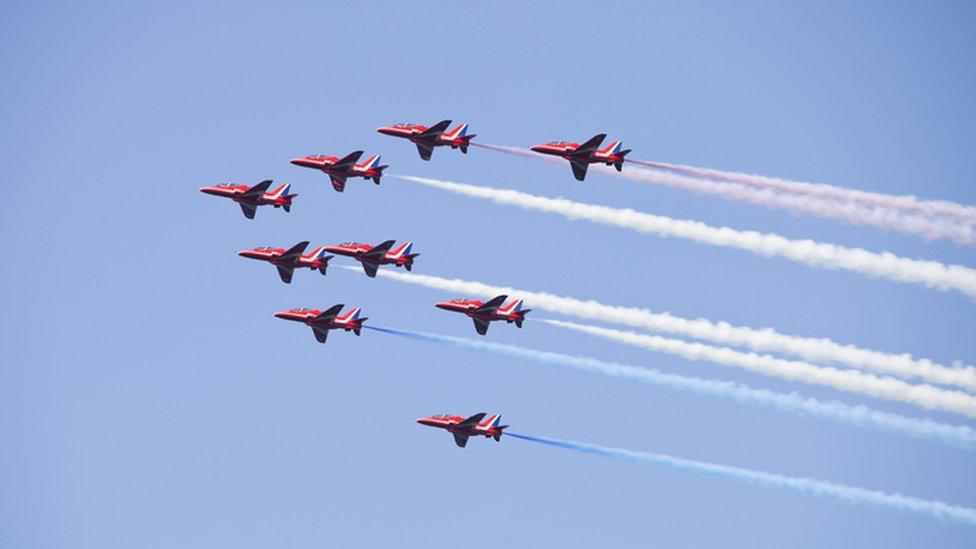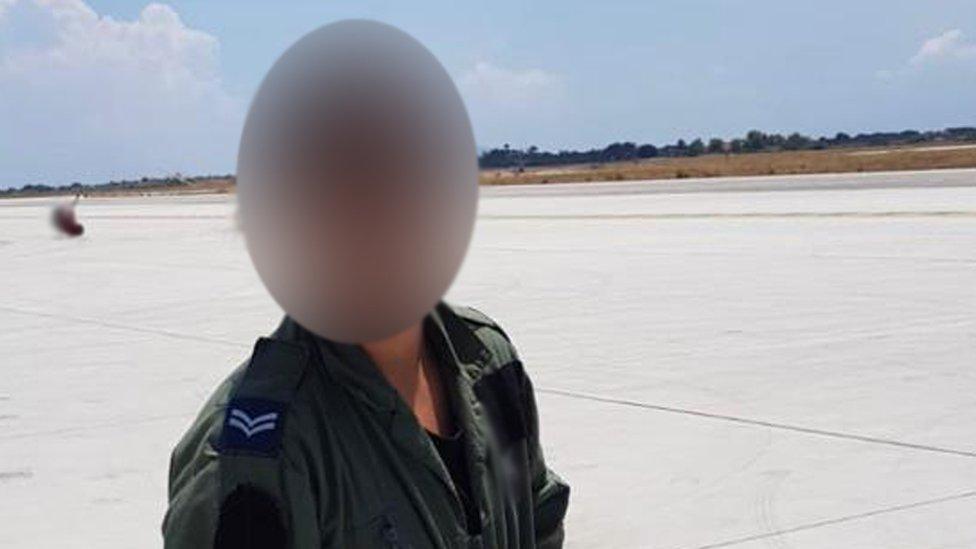RAF servicewoman hid in toilet to escape sexual harassment from boss
- Published

Grace - not her real name - said the RAF's handling of her complaint over sexual harassment was "traumatic"
A former Royal Air Force servicewoman has told the BBC she locked herself in a work toilet to escape "constant" sexual harassment from her boss.
Grace - not her real name - quit her job last year because she felt unsafe and said she would warn other young women against joining the air force.
She described the RAF's handling of her complaint over the harassment as "traumatic".
The force said unacceptable behaviour was "thoroughly investigated".
It added it had made "significant progress" on improving its handling of complaints.
The RAF was criticised over its response to sexual harassment last year after an inquiry into its Red Arrows display team found predatory behaviour towards women was "widespread and normalised".

An inquiry into the RAF's Red Arrows display team found predatory behaviour towards women was "normalised"
Grace, who worked for another part of the RAF, resigned after three years of service after she was left feeling "scared to go into work".
She told the BBC she received "constant explicit sexual remarks and comments directed towards me within the workplace" from her male boss.
"There was really graphic questioning about how I would engage in sexual activities. I can remember on a couple of occasions going into the toilet and locking myself in to stop myself from being alone in a room with that person," she added.
After Grace complained informally about her boss, she was sanctioned by the RAF. The Ministry of Defence later admitted this amounted to "victimisation".
Grace's formal complaint over the harassment was found proven and upheld by the RAF.
The air force recommended her manager receive "disciplinary action" but refused to tell Grace what, if any, action had been taken.
She said the ordeal had left her "an anxious mess".
"It wrecked my mental health," she added.
"I'd have panic attacks because I was so scared to go into work. It shatters your feeling of safety in work."
'Trouble-maker'
Another former RAF servicewoman Jennifer - not her real name - worked as an engineer for the Red Arrows, joining in 2022 while an investigation into behaviour in the squadron was taking place.
She said: "On my first day in the squadron there was some unacceptable behaviour training. I was really shocked to see that really lewd comments were being made about females on the squadron.
"The attitude was that the training was unnecessary."
Jennifer told the BBC she was "seen as a trouble-maker" for complaining about alleged sexual harassment and bullying.
In November last year, the RAF's chief of staff Sir Richard Knighton apologised "unreservedly" after an inquiry found behaviour such as unwanted physical contact, sexual texts and invitations to engage in sexual activity had gone unchallenged within the display team.

Jennifer said she was "seen as a trouble maker" for complaining about alleged sexual harassment
Jennifer raised formal complaints over alleged harassment, bullying and safety concerns after six months in her role. Her complaint was fully investigated but was not upheld and she later resigned.
She told the BBC: "'The part which made me feel most unsafe is how my reports were totally rubbished, and everything was turned back on me, as the person who raised the report. Everything was my fault, or I'd perceived it wrong."
Both Jennifer and Grace said voicing their concerns about the RAF had effectively forced them to end their military careers.
Jennifer said: "'If you raised a complaint you were seen as a trouble-maker, you started to have your work discredited. They closed ranks around you. I was just following procedures in the air force for when things aren't right."
Grace added: "'The complaints process was the worst part for me. And I wouldn't wish that on anyone. I didn't feel like I had any other option but to leave."
'Brushed under the carpet'
A Ministry of Defence survey last year found 92% of RAF personnel who had experienced discrimination, harassment or bullying did not lodge a complaint, with 61% saying they believed nothing would be done.
More than one in 10 women said they had been sexually harassed at work in the last 12 months.
The Centre for Military Justice, a charity which provides free legal advice to people serving in the armed forces, said there was no "fair and impartial way" for military staff to challenge unacceptable conduct.
Lucy Baston, a solicitor for the charity, told the BBC: "People don't feel they can challenge these behaviours.
"A lot of the time we find that this very sadly ends careers for servicewomen and men when they've been subjected to these behaviours."

Lawyer Lucy Baston said military staff had lost their careers after raising concerns
The Labour Party has called for the handling of complaints to be taken out of the hands of the Ministry of Defence. It has pledged, if elected, to appoint an armed forces commissioner who would report directly to Parliament and would have the power to initiate investigations.
"We can't continue with the way that we are, with complaints being brushed under the carpet or hidden out of sight," said shadow armed forces minister Luke Pollard.
An air force spokesperson said: "Any evidence of unacceptable behaviours anywhere in the RAF will be thoroughly investigated. Where appropriate, we will not hesitate to use the most severe sanctions available to deal with those whose behaviour harms others."
They added the Ministry of Defence was "committed to providing a fair, efficient and effective service complaints system and there has been significant progress made to improve its performance, with a particular focus on the efficiency of the system, ensuring complaints are dealt with outside an individual's chain of command and improving the support available".
Servicewoman and servicemen who make complaints are offered "comprehensive welfare support" from trained staff independent of their units, as well as charities and confidential hotlines, the spokesperson said.
They added female Red Arrows personnel had recently "confirmed their willingness and desire to extend their time on the squadron," which the spokesperson said "clearly demonstrates the squadron offers a good working environment, has the right culture and that change has occurred".
Additional reporting by Vicky Carter
If you have been affected by issues raised in this article, there is information and support available via the BBC Action Line.

Follow BBC East Yorkshire and Lincolnshire on Facebook, external, X (formerly Twitter), external, and Instagram, external. Send your story ideas to eastyorkslincs.news@bbc.co.uk, external
- Published14 November 2023

- Published1 November 2023

- Published14 April 2023

- Published11 November 2022
